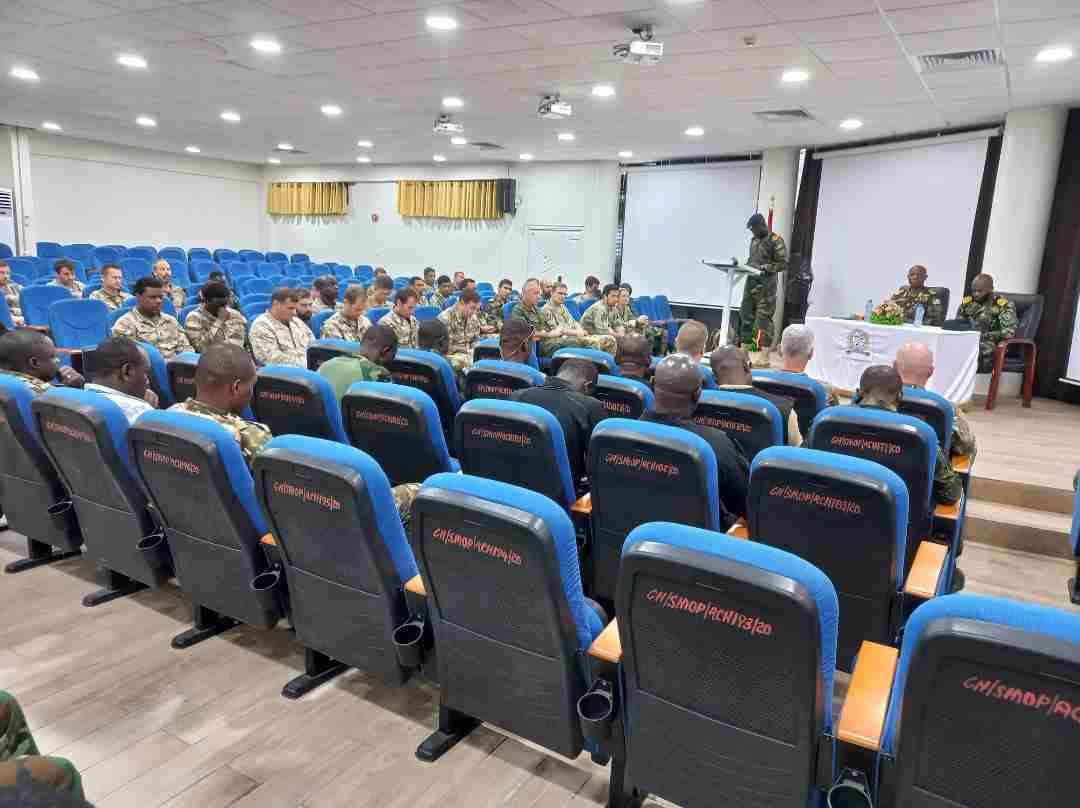The Ghana Armed Forces (GAF) and the Force Republicaines de Cote d’Ivoire (FRCI), in collaboration with the United States Africa Command (USAFRICOMM) have commenced a 15-day series of Joint Multinational Special Operations exercises codenamed EXERCISE FLINTLOCK ’23, to enhance and ensure the collective security of littoral nations along the West African Coast.

FLINTLOCK ’23 which commenced with a backroom phase from 1 to 6 March 2023, unfolded phase two – which is scenario-based field training exercises (FTE) – from 7 March 2023, and is being co-hosted by Ghana and la Cote d’Ivoire, with the venues being Abidjan, Accra (Joint Multinational Headquarters), Tamale and Daboya (codenamed Special Operations Task Group – SOTG Tamale), and Nutekpor (SOTG Volta).
Officially launching the 2nd phase of the maritime aspect of the multinational exercise at Ghana’s Naval Training Command (NAVTRAC), Nutekpor, the Flag Officer Commanding (FOC), NAVTRAC – Commodore (Cdre) Godwin Livinus Bessing said FLINTLOCK ’23 would increase the capacities of participating African Special Operating Forces (SOF) units, to deploy and redeploy.
Cdre Bessing added that the trainings have been designed to improve regional cooperation, ensure interoperability and effective Joint Special Forces Operations in countering crimes in the maritime domain and inland waters, in order to maintain a safe and secured maritime environment for socio-economic development.

The FOC added that FLINTLOCK ’23 which will train with scenarios such as Over the Beach Ops, Anti–Piracy, Hostage Rescue Ops, and Staff Decision-Making Process, offers opportunity for participants to test their skills, refine tactics, ensure preparedness to meet challenges that may arise, and exchange technical knowledge, in a collective quest to deal with maritime crimes which have no borders.
FLINTLOCK, which hitherto used to be a land-based exercise, will also train SOFs to conduct special operations consistent with applicable legal frameworks, enhance multinational cooperation and improve the competence of judicial and border actors amongst others.
Citing the 13 March 2016 Abidjan Grand Bassam terrorist attack, in which 18 people were killed, Cdre Bessing said that incident lends credence to the fact that surveillance should pay attention to vulnerabilities in the maritime environment, as the sea is not only an important medium for lines of communication but also serves as conduit for all sort of nefarious activities.
Speaking in an interview with Defence News Repertoire – Peace Journal – Major (Maj) Adam Demarco of the Special Operations Command, AFRICOMM, who is the Site Lead, SOTG Volta, said FLINTLOCK 23 Ghana is headquartered in Accra as the Joint Multinational Headquarters, as the main effort that is able to conduct cross-border operations to provide collective security through SOTGs Tamale and Volta.

At SOTG Volta, the first and primary aim is to get the SOTG Staff to work together, and secondly, to have the tactical training units being able to train and learn both from the international partners and trainers.
Maj Demarco said although FLINTLOCK does not necessarily leave behind equipment and weapons to its host, in the case of FLINTLOCK 23, investments at NAVTRAC and the Army Special Operations Training School (worth USD500,000) such as barracks refurbishment, wiring of sites, installation of new air conditioning units, new bed frames with mattresses, and a new dock at NAVTRAC, stay behind.
He said the exercise does not focus on equipment of the international friends, but on what the host nations have been using, then try to leverage on them to optimize their uses, rather than to bring and leave behind any type of weapons.
“At the end of the day, what defines success is that we are able to bring together a cohort of African partners that can work together, train together, and essentially tackle the problems that this region is facing. There are various mechanisms that are already in place, and we want to bolster that, whether it is the Accra Initiative, the G5 Sahel, we want to support that using Flintlock”, Maj Demarco said.

He said FLINTLOCK, which is an annual exercise that has been conducted since 2005, will be in Ghana again in 2024, to allow AFRICOMM to invest in Ghana, to build some of their small-scale projects, refurbish more buildings, and then to really see how training progresses.
Referencing the US-Africa Leaders’ Summit in 2022, where US President Joe Biden declared support to the African continent, Maj Demarco said the US understands the forecast that majority of the world’s population would be on the African continent. Realizing the threats that the people face, the soldier predicts that moving forward, Africa would see a lot more of American investments, and enduring partnerships.
“That is why we are here. We are going to be here. We are going to continue FLINTLOCK and we are actually trying to grow it to bring more African partners to the table, so we can take what we have done here, and scale it a little bit more, so we can bring everyone together for bigger collective security efforts”, Maj Demarco said.
EX FLINTLOCK ‘23 is a USAFRICOMM premier SOF exercise that has brought together over 29 international and African partners together, to work collectively and collaboratively in order to advance collective security in the littoral states in the Gulf of Guinea region.
Ghana Army’s (GA) Special Forces are training with their international partners and trainers at SOTG Tamale, whiles Ghana Navy’s Special Boat Squadron (SBS) trains with maritime scenarios at SOTG Volta, as the Ghana Air Force handles transportation of equipment, assets and Medical Evacuation (MEDEVAC) in the exercising areas.
Participating nations from both North Atlantic Treaty Organization (NATO) and non-NATO states include Brazil, Cape Verde, Czech Republic, Denmark, Italy, Morocco, Netherlands, Nigeria, South Africa, Spain, Togo, Tunisia, United Kingdom, and the United States (including personnel from USAFRICOMM Special Operations Command Africa, 44th Medical Brigade, Special Operations Detachment Alpha, and 3rd Special Forces Group.
Across the 5 sites in the two hosting countries, there are combined personnel of about 1400, not only challengingly training mentally and physically, but also building partnerships to facilitate interoperability to address key security challenges.
By Kofi Ampeah-Woode
